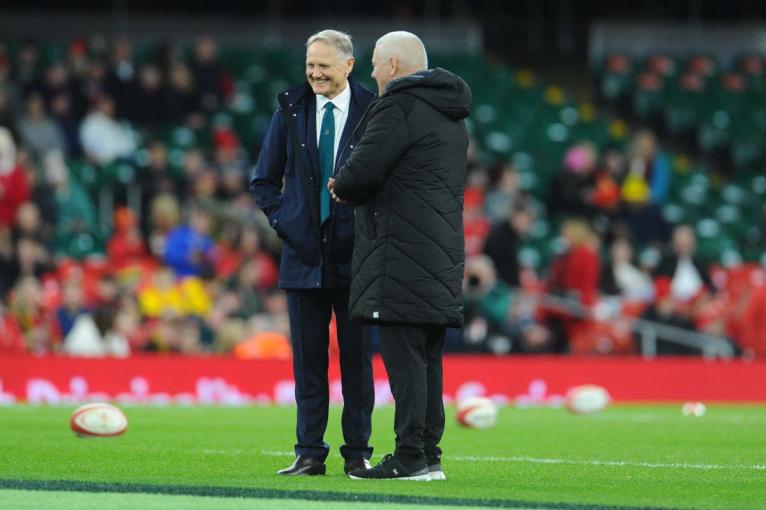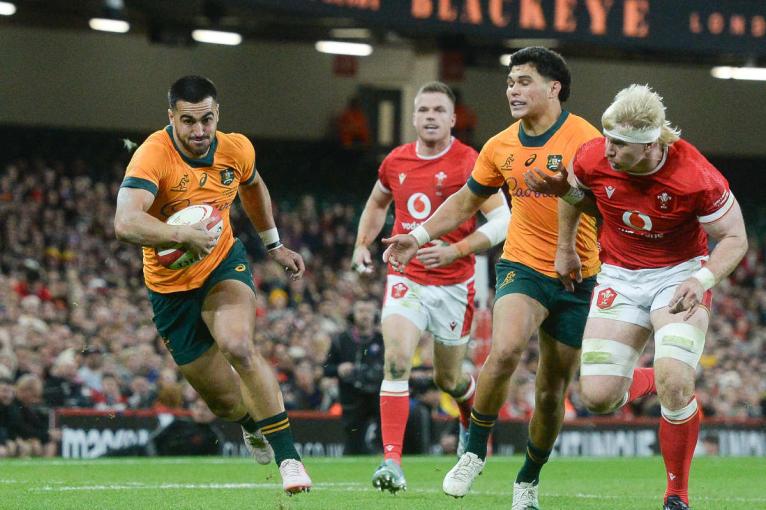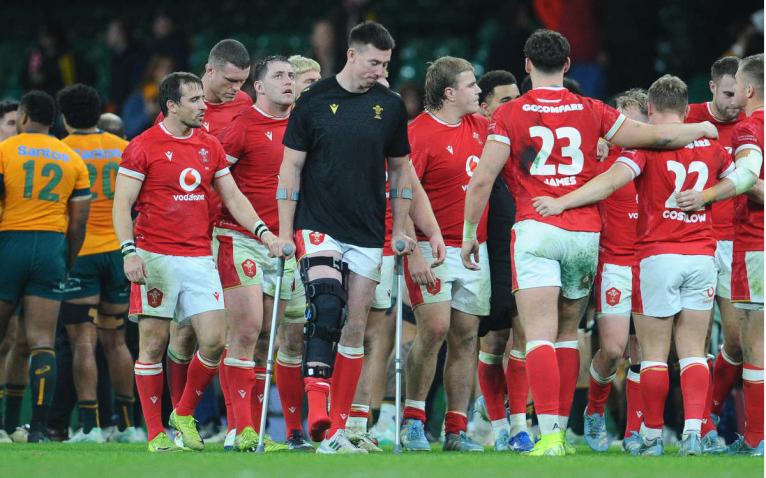You know a coach is in trouble when one of his long-time rivals is at pains to shower him with words of encouragement. So when a smiling Joe Schmidt opined that he empathised with the ‘lean spell’ Warren Gatland was going through, you knew things had gone seriously awry for his fellow Kiwi.
The sight of Gatland being grilled at the top table – remember, a table he had feasted on with three Grand Slams and four Six Nations Championships – felt like a seminal moment in his 17-year relationship with the Welsh rugby public. Whether the damage of a record 11 losses has made the position of Wales’s most successful coach untenable remains to be seen, but with the visit of South Africa fast approaching, it is likely to be a dirty dozen defeats within days. Ouch.
What the assembled press pack were left in no doubt about was the New Zealander was seriously considering his position. He was showing signs of vulnerability that had been hitherto absent. Gone was the almost chippy, confrontational mien of a top-class hooker, and in its place a man unsure of himself, often pausing and answering his own questions.
If there was a common theme, it was to double-down that he loved Welsh rugby and would put it first, and that if the powers-that-be really wanted him gone, then so be it. He then asked his audience who would replace him and if so, would that be the panacea to all Welsh rugby’s ills? No-one of sane mind in the room could say with any certainty his departure would expedite a return to anything approaching rude health, but similarly, could Wales do much worse than a calendar year which promises to be their worst since 1937? It’s quite the conundrum.

The filleting of an eight-try, 52-20 drubbing by a Wallaby team, itself thumped by Argentina 67-27 in September, seemed immaterial to the sombre post-match inquisition, which took on a wider malaise in Welsh rugby. Smarting from the criticism by his former players, Gatland talked about the strain on his wife and family, and you would expect many of his close confidantes are willing him to settle up his affairs with the WRU and return to New Zealand where he can soak up some rays and a fine red. Remember, at 61, he isn’t far off retirement age and is not short of a bob after a hugely successful coaching career. Indeed, does he need the hassle of witnessing a country falling out of love with him in real time, when only a matter of years ago, he was cutting the ribbon to the eponymously named Gatland’s Gate, such was the country’s reverence to him as an honorary Welshman.
In the cold light of day, there would seem little sense in parting ways days before the visit of the world champions. Damage limitation has to be the priority, but this is Welsh rugby and nothing would shock a battle-weary public.
Don’t forget, the Principality Stadium is the coal furnace which powers the game in Wales, generating £10m-a-game, and filling the stadium is a pre-requisite in order to generate annual revenues approaching £100m-a-year.
If the union does act, it has to be promptly. There is little sense in waiting until the New Year to make a change. The first Six Nations game is just 73 days away in Paris. Given his standing in the game in Wales, you would think a warm and respectful exit could be navigated. If, however, Gatland shows the fight and appetite for the job, could he be given the Six Nations to see if he can inspire a turnaround with Taulupe Faletau, Josh Adams and Liam Williams to bolster a squad still woefully short on experience? Against Australia, if you took Gareth Anscombe out of the Wales backline, it averaged six caps a player. This is a Welsh team in pre-school in Test terms.
What will have petrified the WRU accountants was the 19,000 empty seats. Sure, the Wallabies are no longer top billers, but the sight of hundreds of fans disappearing with the game still in progress was deeply worrying. Don’t forget, the Principality Stadium is the coal furnace which powers the game in Wales, generating £10m a match, and filling the stadium is a pre-requisite to drive annual revenues approaching £100m a year. A losing Wales is not good for business. Hell, without a win in over 400 days, more than 30,000 children have been born in Wales without ever knowing what it’s like to witness a Wales victory. As a rugby nation, we have passed the joshing stage and are now eliciting sympathy.

There is no doubt the players care deeply. Captain Dewi Lake’s craggy features were etched in emotional strain and he spoke eloquently and passionately about not throwing in the towel with the world’s most beastly pack en route to Cardiff sensing blood. It was hard not to feel for him.
Gatland wearily mentioned the constant cycle of negativity in Wales, but that was absent in 2008, 2012, 2013 and 2019. Why? Because the sporting public is fickle and likes to attach itself to winners. And right now, Welsh rugby is in the mire. There is talk of Wales morphing into a ‘football’ nation, but that is nonsense. If Welsh rugby starts eking out victories, the fans will soon return, smiles on faces.
One other constant emanating from Gatland was the word ‘control’. He has been openly critical of the regions and their inability to prepare his players for Test duty, pointing to successful World Cup campaigns on his watch.
In the boardroom, we have heard precious little from WRU chief executive Abi Tierney, who has been in post since January, or chairman Richard Collier-Keywood, as its fans await a transparent strategic plan to take Wales into the next decade. Nineteen months after the sexism and misogyny scandal that engulfed the union and led to an official enquiry, Nigel Walker is currently battling controversy for his regrettable part in fractious negotiations over women’s contracts and is under serious scrutiny with Ioan Cunningham carrying the can for the unedifying palaver. A period of stability would be in everyone’s interest.
One other constant emanating from Gatland was the word ‘control’. He has been openly critical of the regions and their inability to prepare his players for Test duty, pointing to successful World Cup campaigns on his watch, but his detractors will argue the very same businesses have been starved of funding and saddled with loans and high interest rates from the union in the wake of the pandemic. Fund us and you will reap the rewards, starve us and we will wither on the vine appears to be the consistent message. Relations aren’t on a war footing but the two factions are hardly finishing each other’s sentences, which is an abject failure on all sides.

Everywhere you look, Wales are dousing fires. Their record at U20 level has been on a downward trajectory over the past decade and the porous academy pathway highlighted when Immanuel Feyi-Waboso, a generational player who was born and raised in Cardiff, was lost to England through at best, a breakdown in communication and at worst, a dereliction of duty. There are droves of gifted Welsh rugby players being showered with scholarships at elite English public schools, so more will be lost to our neighbours over Offa’s Dyke. As yet, no one has accepted culpability for the exodus.
So what to do? There are plenty of independent thinkers within Welsh rugby. In time, the intellect of Jamie Roberts, Alun Wyn Jones and Dan Biggar should surely be harnessed to manage the running of the game, because hearts and minds need to be wooed back into the bosom of the ‘national’ sport before it becomes irrelevant and on the verge of extinction. Few would blame them for opting for an easy life.
What the WRU cannot afford to do is not act. To bury their heads in the sand. Radical change is required to arrest stagnation but beyond the whingeing and moaning – which is helping nobody – Wales needs positivity and a plan. Welsh rugby, like Gatland, is lost for words and if Wales’s most venerated coach has raised the white flag, then what hope is left?


Wales's problems are far more than Gatland. As a Welshman in exile I've actually got nothing against him staying on. This autumn campaign has been a disaster, but perhaps the WRU should justify why they chose to play against the world's strongest teams and not at least one Tier 2 nation, just to showcase the squad. The problems come from the very bottom, through the franchise system to the board of the WRU itself. If anything it is the whole structure that needs an overhaul from top to bottom.
I'm afraid Gatland lost my respect with his uncalled for comments earlier in the year and his whinging about the so-called Boks' bad attitude in the Lions' 2021 tour. I also think he's not done my '6 nations' team much good this time round and they'll be well rid of him with his dated approach.
A new coach won’t solve all our ills which are abundant, but as with Aussie coach and many soccer examples, a new voice can provide success in the short term, bring breathing space while the WRU, academies, regions, under 20’s etc can be totally stress tested, a system put in place for long term success. I won’t hold my breath. The WRU put Gatlands contract in place, which was over generous with no break clause-they should be the ones to take the hit when he goes. Walker first to be dismissed, his salary can contribute.
Rassie is ruling the roost because he put systems in place to find and develop the best players from schoolboy level up. Its an entire system and organisation that now, several years down the line, presents him with a pipeline of battle ready talent.
Wales lacks this, lacks a Director of Rugby. Firing Gatland won't change this fact. He is an world class coach. If anything Abi Tierney should be shipped out for failing to put these systems in place over the last 11 months.
Sack the kiwi. They have destroyed Australian rugby too.
What a moronic comment.
Gatland is not the problem. that's like firing the marketing manager at your business when ops is failing delivery. The hard yards are in the back-end. Focus there and do what you can to support the top. Takes some 'political will' - but that's the only way. Long(ish) road back but it need not be as big of a hill as implied.
Garland isn't the problem but that still doesn't mean he's the right man for the job. There are much bigger problems than him but I don't think he's part of the solution. Since leaving Wales and Shaun Edwards, his record as a coach has been abysmal.
Gatland wasn't coach in 2013 as he was on sabbatical with the Lions. Rob Howley was in charge then and again in 2017.
If there’s one thing I’ve become quite certain about in international rugby, is that the head coach is the most importantly spoke in the wheel.
You’ll be hard pressed to find a great team that didn’t have a great coach.
Yes there are other variables, which must combine effectively, but no great coach, no great results.
To this end it should be a priority to have a succession plan in place for head coaches of international teams. For when (1) coaches need to be dismissed or (2) quit on their own terms for whatever reason.
The trouble now for Wales (and soon to be England) is when there are no plans in place, we go two steps further back.
I’d have a plan B in the mix at all times. Preferably in the team already. Or someone outside identified as a successor and kept warm by the union.
You miss the point. There is no pipeline of players. A coach cannot change that. That is up to the Welsh RFU, which have failed.
Rassie is a clever bugger, no doubt, but the Boks could play 52 players this year because of the systems they have put in place to find and develop players from schoolboy level up.
I think he’s just had his day. He brought nothing (well, no wins) to the Chiefs a few years back either.
I admire anyone that makes it that far in the sport and he achieved some great things, and he came back with the greatest intentions for welsh rugby.
If he’s that keen to be involved in the game still why not a gig helping out the lower levels of the sport in wales?
Plenty of club coaches - at the amatuer grass roots level- would love to get mentored by Warren Gatland.
He could work on pathways, skill development, there’s endless ways he can serve welsh rugby.
Gatland did some good stuff with Wales, he wouldn't have managed it without Shaun Edwards and he's done nothing since apart from lead the Chiefs and now Wales on famous losing streaks. He should never have gone back, for his sake and that of Wales, it was as dumb as Japan appointing Eddie Jones again. You can't recreate the past, you need to create a new present.
Dismissing the threat of football as nonsense is in itself burying your head in the sand.
Most males I know support both rugby and football. However, in most cases football comes first with rugby second.